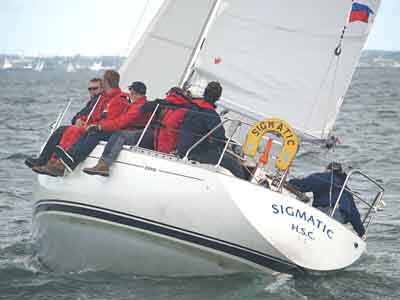Displaying items by tag: Sigma 33 East Coast Association
Sigma 33 East Coast Association
History (courtesy of the UK Sigma Association website)
Click here for all the latest Sigma 33 News and Updates.
The Boat
• Designed by David Thomas, well-known for cruiser/racer designs such as Sonata, Impala, Sigma 33 and 38, as well as the Hunter 707.
• The original concept was to design a 35 footer to compete for acceptance at the Royal Ocean Racing Club’s 1978 Offshore One-design Conference, which was to select three one-designs to promote in substitution for the then-prevalent IOR system. The three chosen were the Impala, the 101 (designed by Jan Kjaerulff) and Jeremy Rodgers’ OOD 34. Sensing that the 33 foot 101 was too Scandinavian for British tastes, David Thomas decided to scale down to 33 feet. His intention was to design a moderate displacement yacht that would look racy and be competitive under IOR, but be tractable and easy to sail to near optimum speed.
• Initially the class was named the Skua 33, but when a Scottish fleet advised that they were already called Skuas, the name was changed to Sigma 33.
• Built by Marine Projects (Plymouth) Limited in Devon. (Tel: 01752 203888)
• Total number built 364, starting in December 1978 with hull no. A3001 and ending in December 1991 with hull no. A3364 (in addition, approximately 44 Sigma 33Cs were built between November 1981 and April 1985, with hull numbers between A4001 and A4212. These have a shorter, masthead rig and a longer, shallower draft keel.)
• Builder’s Dimensions: LOA 32’ 6” 9.88m; LWL 26’ 3” 8.00m; Beam 10’ 6” 3.20m; Draft 5’ 9” 1.75m; Displacement 9,200lbs 4,182kg
• Construction is straightforward GRP with foam-cored floors and integral bulkheads. Early boats had off-white hull gel coats with either blue or cream decks; later ones had white hulls and decks plus aluminium window frames and go-faster stripes along the coachroof. The interior joinery was also altered.
• Class sails are by Elstrom Sobstad , HYS, Port Hamble, Hamble, Southampton, Hampshire SO31 4NN. Tel: 023 8045 6205, fax: 023 8045 2465. The class has adopted relatively high-tech Genesis Platinum sails which incorporate kevlar fibres.
• Price when new in 1979 was £16,790 plus VAT. By 1990 this had risen to £37,475 plus VAT.
 Pictured left: Sigmatic powering their way to first place on the last race of the Volvo Dun Laoghaire Regatta 2009 (courtesy Sigma 33 East Coast Association website)
Pictured left: Sigmatic powering their way to first place on the last race of the Volvo Dun Laoghaire Regatta 2009 (courtesy Sigma 33 East Coast Association website)
Sigma 33 East Coast Association, c/o Sandra Moore, Honorary Secretary, 49 Bellevue Road, Glenageary, Co. Dublin. Tel: 087 629 1568, fax: [email protected], email: [email protected]
In March 2009, Afloat's Graham Smith reported on the Class: "There’s no change in the Sigma 33 class since last year. The fleet remains at 18 and they are all in Dun Laoghaire, while Tim Goodbody continues to dominate the class.
Apart from winning two of the three DBSC series during the season, he and his crew on White Mischief also won the ROYC Superleague, the East Coast Championships and then retained the National title. Just to break the monopoly, Paddy Maguire won the Colman O’Sullivan Trophy, Dermod Baker took the Fireseal Trophy and the Tuesday series was won by Pippa IV, helmed by A. Blake. National Champion 2009: Tim Goodbody, Royal Irish YC."
There is a space for Irish boating clubs and racing classes to use as their own bulletin board and forum for announcements and discussion. If you want to see a dedicated forum slot for your club or class, click here























































